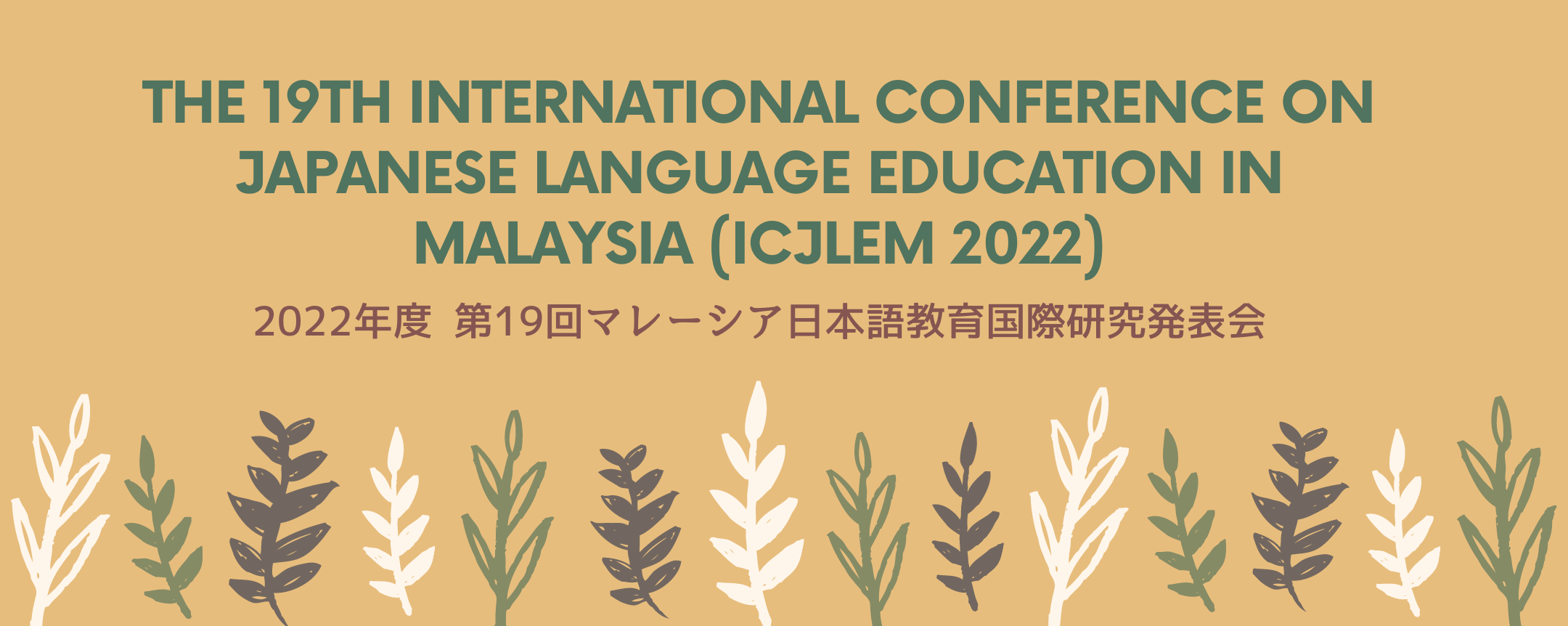THE 19TH INTERNATIONAL CONFERENCE
ON JAPANESE LANGUAGE EDUCATION IN MALAYSIA (ICJLEM 2022)
The International Conference on Japanese Language Education in Malaysia is co-organized by The Japan Foundation Kuala Lumpur (JFKL), Ambang Asuhan Jepun (AAJ) University of Malaya, and the Malaysian Japanese Language Instructors Society (MAJLIS). This conference serves as a platform for Japanese language teachers not only in Malaysia but in other countries as well, to present the findings of their research and reports with their peers.
Since April 2022, the rules and regulations regarding Covid-19 in Malaysia had gradually been relaxed; however, the number of new infection cases of Covid-19 is still not low enough. Therefore, the organizers have decided to follow the last two years’ practice by bringing the Conference ONLINE this year too.
【Event Outline】
・Program
| Program |
Date/Period |
Medium |
| Keynote Lecture |
1 Oct 2022(Sat)
Morning 9:30- (Tentatively) |
Live on Zoom |
| Oral Presentation |
1 Oct 2022(Sat)
Afternoon 14:00- (Tentatively) |
| Poster Presentation |
23 Sept (Fri) ~8 Oct (Sat) |
Video recording on YouTube |
| Teacher’s Corner |
9 Sept (Fri) ~8 Oct (Sat) |
※The organizers will take every possible security measure to use Zoom safely.
CALL FOR PARTICIPANTS
flyer
※Registration and fee payment is required to participate in this conference, including watching “Poster Presentation” and “Teacher’s Corner” video’s on YouTube.
Deadline: 29 Sept 2022 (Thu)
To register:
i) Please complete your payment here https://www.majliskyoshikai.com/icjlem-2022
We only accept online payments.
ii) An email will be sent automatically to your email after payment completion.
iii) Access the link from the email and fill in the registration form to register.
※Registration Fee: MYR20
KEYNOTE LECTURE
|
1 Oct 2022(Sat) Morning 9:30- (Tentatively)
Live on Zoom Flyer |
| Speaker |
Dr. KUBOTA Yoshiko
Center for Japanese Language, Waseda University
|
| Title |
Beliefs of the Japanese language teachers and learners: What can we learn from the quantitative and the qualitative research
|
【Outline】In Japanese, the term “belief” can be translated as “faith (shinnen)”, “assurance (kakushin)”, “assumption (omoikomi)”, etc. In the field of education, “belief” sometimes could be used to describe one’s perspectives of learning or teaching. It is deemed to be difficult to understand the beliefs of learner and teacher, but to some extent, their beliefs certainly could influence their learning and teaching behaviour. Thus, it is important to understand the actual situation.
In the first half of the lecture, you will be given a chance to think about your own beliefs through looking at the specific issues. Together, let us think about what a belief is and what kind of changes will occur if you are aware of it. In the second half, we will take a look at the previous research regarding beliefs and find out what we could see clearly from the quantitative and qualitative results. By focusing on the problems at hand, we will further discuss about the relationship between learner’s beliefs and abilities, the gap of beliefs between learner and teacher, the gap of beliefs among teachers, as well as the changes of beliefs in learner and teacher. |
| 【Biography】Dr. KUBOTA Yoshiko is a lecturer from Center for Japanese Language, Waseda University, Japan. She obtained her Ph.D in Applied Linguistics from Meikai University and have previously affiliated with the Japan Foundation Japanese-Language Institute, Urawa, from 1994 to 2016. She was dispatched to the The Japan Foundation Köln Japan Cultural Institute, Germany, from 2000 to 2002. |
ORAL PRESENTATION
|
1 Oct 2022(Sat) Afternoon 14:00- (Tentatively)
Live on Zoom |
| Submission Guideline |
HERE ※The application is already closed. |
| Program |
HERE |
POSTER PRESENTATION
|
23 Sept 2022 (Fri) ~8 Oct 2022 (Sat)
Video recording on YouTube |
| Submission Guideline |
HERE ※The application is already closed. |
| Program |
HERE |
TEACHER’S CORNER
|
9 Sept 2022 (Fri) ~8 Oct 2022 (Sat)
Video recording on YouTube |
| Submission Guideline |
HERE ※The application is already closed. |
| Program |
HERE |



